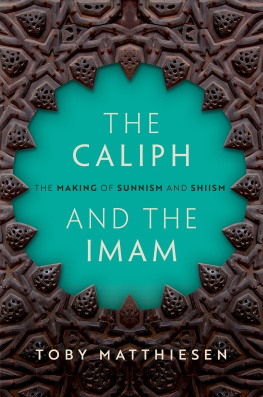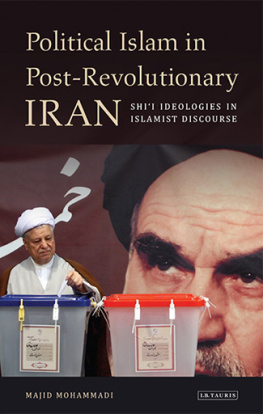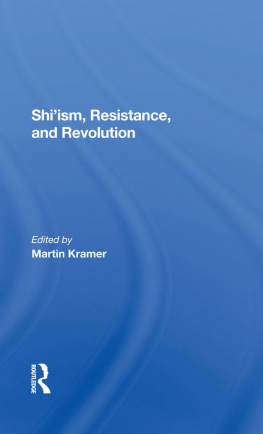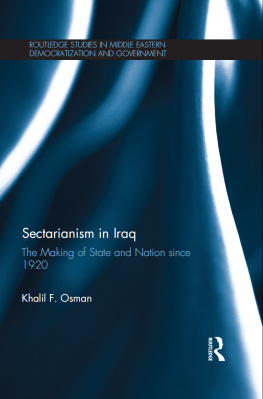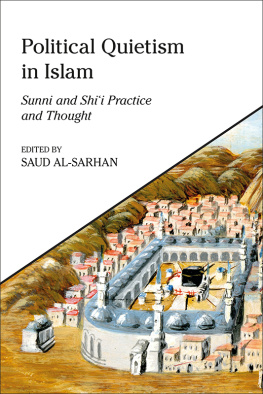Elisheva Machlis is a lecturer at Tel Aviv University and a researcher at the Alliance Center for Iranian Studies, Tel Aviv University. She is also a visiting fellow at the Levzion Center for Islamic Studies, Hebrew University. She holds a PhD from the faculty of Asian and Middle Eastern Studies, University of Cambridge.

Published in 2014 by I.B.Tauris & Co Ltd
6 Salem Road, London W2 4BU
175 Fifth Avenue, New York NY 10010
www.ibtauris.com
Distributed in the United States and Canada
Exclusively by Palgrave Macmillan
175 Fifth Avenue, New York NY 10010
Copyright 2014 Elisheva Machlis
The right of Elisheva Machlis to be identified as the author of this work has been asserted by the author in accordance with the Copyright, Designs and Patents Act 1988.
All rights reserved. Except for brief quotations in a review, this book, or any part thereof, may not be reproduced, stored in or introduced into a retrieval system, or transmitted, in any form or by any means, electronic, mechanical, photocopying, recording or otherwise, without the prior written permission of the publisher.
Library of Modern Religion 39
ISBN: 978 1 78076 720 8
eISBN: 978 0 85773 778 6
ePDF: 978 1 78673 951 3
A full CIP record for this book is available from the British Library
A full CIP record for this book is available from the Library of Congress
Library of Congress catalog card: available
Dedicated to my children Nitsan, Ori and Yaniv
ACKNOWLEDGEMENTS
The journey of this book began in the University of Cambridge, where I spent several years writing my PhD thesis and acquiring the tools of critical thinking, while immersed in the history and culture of this beautiful town. I completed this book upon returning to Israel, where years earlier I had developed my interest in the society, culture and politics of the Middle East.
I wish to thank several people who contributed to the completion of this book. Prof. Meir Litvak of the Alliance Center for Iranian Studies at Tel Aviv University provided me with a post-doctoral fellowship that allowed me to pursue my research. Prof Litvak, with his vast knowledge, instilled in me a keen interest in Shia studies. Following my project from its inception, his deep insights were a major contribution in shaping this book. I would also like to thank my PhD supervisor, Dr Amira K. Bennison, who provided meticulous guidance for my thesis. Her wisdom and wide-ranging knowledge have been a great source of inspiration for me. Azmina Sidique and Maria Marsh from I.B. Tauris were highly enthusiastic about this project from its early days, and provided me with very professional advice to bring it to completion.
Most of all, this study would not have been possible without the endless support of my family. My parents, Sheldon and Irene Fink, provided continuous encouragement and interest in my research. My husband, Avi Machlis, endured many hours of editing and believed in this project from its inception, and my wonderful children, Nitsan, Ori and Yaniv have been a source of joy throughout the process.
A NOTE ON TRANSLITERATION
The transliteration used in this study is based on the system adopted by the International Journal of Middle East Studies. Exceptions include omitting diacritical marks in words that are in common use in English. Words that have not been fully transliterated are Hadith, Imam, Imami, Mahdi, Quran, Safavid, Salafi, Shii, Sufi and Sunni. Names in Persian have been given generally in their transliterated Arabic form. Islamic terms, such as tawd or tauhid, are provided in their Arabic or Persian versions according to the original text. For geographical locations that often appear in English, such as Beirut and Tehran, the widespread English usage has been employed.
LIST OF ABBREVIATIONS
| BJMES | British Journal of Middle Eastern Studies |
| EI2 | Encyclopaedia of Islam (Second Edition) |
| FO | Foreign Office |
| IJMES | International Journal of Middle East Studies |
| MAE | Ministre des Affaires trangres |
| MES | Middle East Studies |
| MW | The Muslim World |
| PRO | Public Record Office |
| SI | Studia Islamica |
| WI | Die Welt des Islams |
INTRODUCTION
When Sayyid Musin al-Amn al-mil visited Najaf in 1933, the Shii Lebanese cleric was pleased to encounter the introduction of electricity to this holy Shii city. Yet his contemporary Shii communities in Lebanon and Iraq were not always equally enthralled by their first contact with new technologies. At times, technical changes had cast doubt over core Shii beliefs. Indeed, the illumination of Najaf elicited mixed reactions, as described by Musin al-Amn himself, who met two clerics with different approaches towards this issue:
The first asked al-Amn: Did you see that the noble courtyard of Al is lit by electricity? This [development] brings us pleasure and therefore I am very happy. Musin al-Amn replied: I agree. However, another Shii vehemently opposed the introduction of electricity at the site, and told al-Amn: People these days would rather have died many years ago. You ask me why? Is it not true that the electricity is above the head of The Commander of the Faithful [Al]? I was amazed by the contrasting reasoning of these two people, Musin al-Amn said.
The lighting of Najaf occurred during the initial stages in which the Shiis of Iraq began to be exposed to modern change. Until the twentieth century, the Shiis in the Arab world had only minimal contact with the larger Sunni community and were mostly shielded from changes that began taking place in the Ottoman Empire during the mid-nineteenth century with the far-reaching reforms undertaken under the Tanzimat. In the subsequent years, these segregated communities gradually came into contact with new developments through the expansion of communication, the development of state-education and a process of socio-political change that began to take place following the emergence of the new nation-states of Iraq and Lebanon.
Electricity was introduced to the Shii holy city of Najaf about a decade after the establishment of the nation-state of Iraq. Musin al-Amn, the Lebanese cleric who later became the spiritual leader of the local Shii community in Damascus, was studying in Najaf at the time. Upon hearing the discussion on the lighting of the noble courtyard of Al, Musin al-Amn agreed with his fellow Shii that this development was beneficial to the community. His reaction suggested that he accepted technological progress from a rational perspective and did not perceive modernisation as a threat, or as an issue that required justification on religious grounds. With the transition to the twentieth century, modern change was introduced into the secluded Shii communities of Iraq and Lebanon, and, as a result, clerics such as Musin al-Amn were also exposed to new developments. The modern era also led to a belief in a new dawn in inter-sectarian relations, as these communities became part of the emerging national entities of Iraq and Lebanon.


